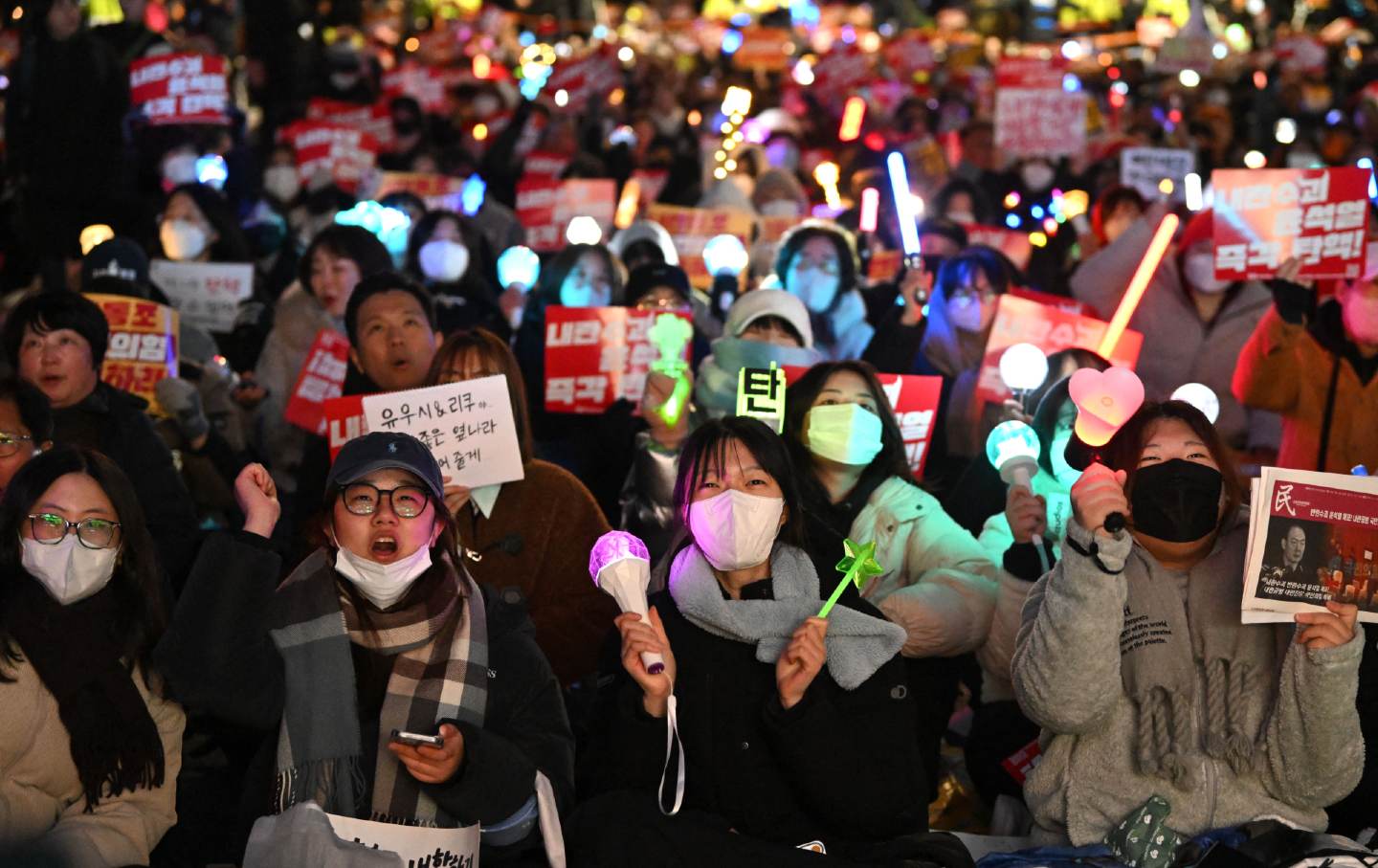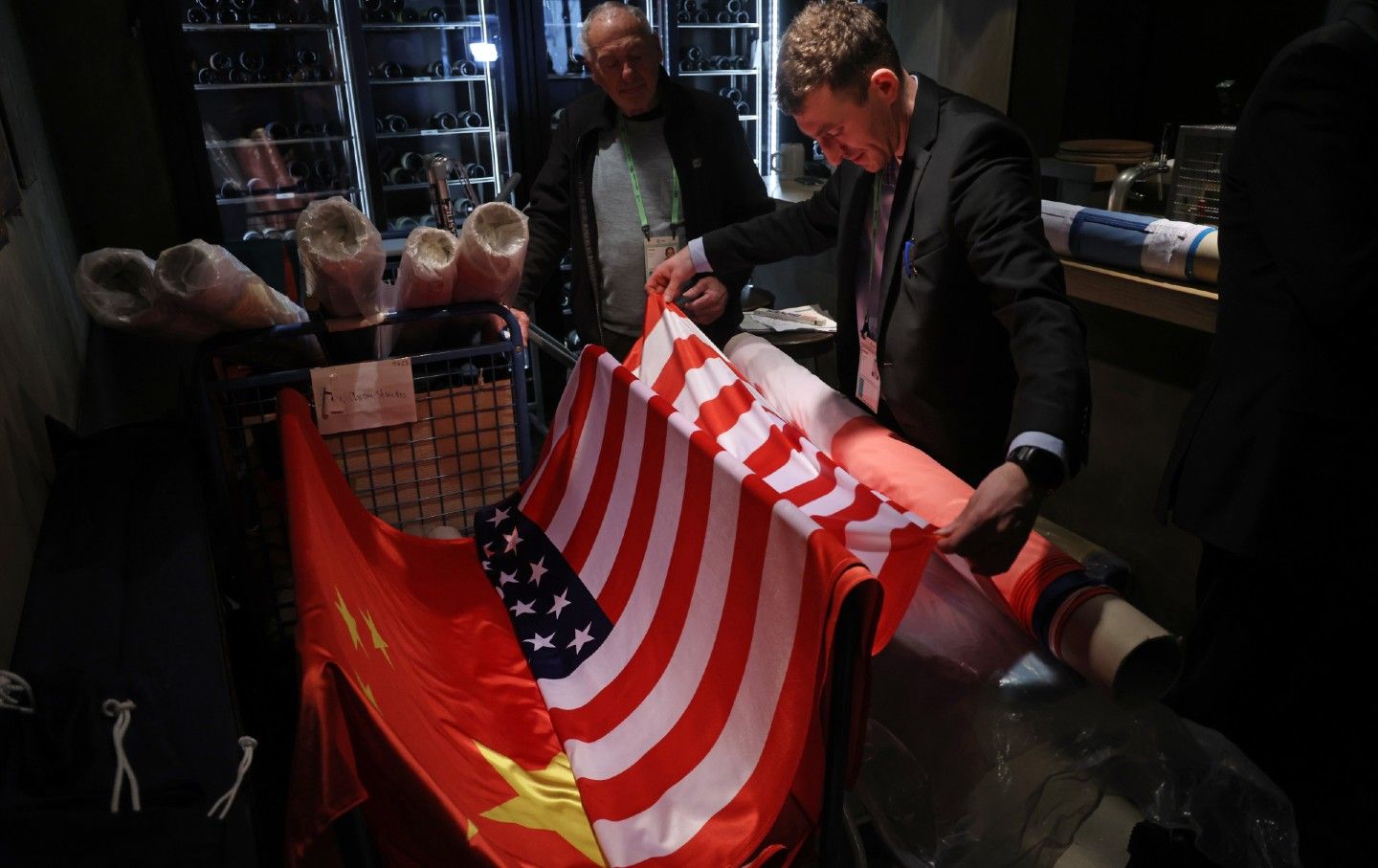Young Women Are Leading the “Light Stick Revolution” to Oust South Korea’s Antifeminist President
Yoon Suk Yeol rose to power by courting antifeminists. Now young women are going to be his downfall.

Protesters wave light sticks during a demonstration demanding President Yoon Suk Yeol’s resignation outside the National Assembly in Seoul on December 10, 2024.
(Jung Yeon-je / AFP via Getty Images)
For weeks, Lee Ha-Jin went out into freezing weather to join the hundreds of thousands of South Koreans on the streets calling for the ouster of President Yoon Suk Yeol after his declaration of martial law. More often than not, the 29-year-old school teacher said she was surrounded by other young women like her: “So many women, including myself, have been waiting for a moment like this for a long time, because we were so sick and tired of all the hate towards us for the past two years.”
Since Yoon took power on an anti-feminist platform in 2022, Lee said, she watched the online misogyny and the barrage of attacks on women’s rights grow. Now, young women are mobilizing to bring Yoon down; they’re fueling the mass protests that pushed lawmakers to vote in favor of his impeachment on December 14. Waving K-pop light sticks that turn the streets into a moving sea of colors, women in their 20s and 30s have become a symbol of civic solidarity and defenders of democracy against authoritarianism and misogyny.
At the same time, Yoon’s downfall serves as a warning about the rise of antifeminist populism in many parts of the world: A politician who willfully dismisses the rights of women is exactly the type of leader who may one day threaten a nation’s democracy.
In Washington, DC, the Biden administration praised Yoon for taking a more hard-line stance toward China and North Korea and forging closer ties with Japan, Korea’s former colonial ruler. Yoon’s performance singing “American Pie” at the White House during his state visit last year charmed the Washington establishment. Kurt Campbell, the US deputy secretary of state, even said Yoon deserved the Nobel Peace Prize along with Japanese Prime Minister Fumio Kishida for strengthening the bonds between the two key US allies in Asia.
But at home, Yoon was an unpopular leader whose approval ratings hovered far below his predecessors’. Yoon, a former prosecutor with no prior political experience, faced constant criticism for his combative governing style, domestic policy missteps, disregard for the rights of social minorities, and the corruption allegations against the first lady. Yoon’s policies concerning women, in particular, drew alarm before he even took office. During his presidential campaign, he vowed to dismantle the country’s gender equality ministry, despite South Korea’s having one of the worst records on women’s rights in the industrialized world.
For three decades, South Korea has had the biggest gender pay gap among the member nations of the Organization of Economic Cooperation and Development. It has also consistently ranked as the worst place with an advanced economy to be a working woman. But Yoon denied the existence of structural sexism, blamed feminism for the country’s low birthrates, and promised to more harshly punish women who make false claims of sexual assault. The pledges echoed the rallying cries of the Korean “manosphere”—a constellation of Internet forums popular with young men and where misogyny is widespread.
After Yoon won the election with huge support from young men, gender equality became a taboo topic in public life and past gains made for women came under attack.
Under Yoon, the government decided to remove the term “gender equality” and references to sexual minorities from new school textbooks. State offices that had previously handled policies for women or gender equality rebranded themselves as being responsible for “family” or “children,” focusing on women only as mothers. Government budgets to help victims of gender violence or discrimination or to teach children about their sexual rights were drastically slashed or removed entirely. Yoon could not dismantle the gender equality ministry over the opposition of lawmakers, but the ministry lost influence, with Yoon leaving the minister’s position vacant for nearly a year.
Yoon’s government and party didn’t stop at going after women. Disability rights activists demanding better public transportation access faced increasingly violent crackdowns by the authorities, as well as online condemnation after an ex-leader of Yoon’s party labeled their protests “uncivilized.” Police and prosecutors harshly cracked down on labor unions demanding better working conditions, while Yoon’s party advocated paying migrant care workers less than the minimum wage. As Yoon declared a war against “fake news,” the number of defamation suits filed by administration officials and politicians against critical journalists grew, sending the country’s global rankings on press freedom plunging.
South Korea’s human rights commission is now headed by a conservative ex-prosecutor who opposes, among other things, banning discrimination based on characteristics like gender, disability, or sexual orientation—an idea previously supported by his own commission. He claims that an anti-discrimination law would hurt “the freedom of expression” to criticize homosexuality and trigger a “communist revolution.” Meanwhile, in just one year, public school libraries removed more than 2,500 books about sex education, gender equality, or feminism—including a novel by Nobel Prize winner Han Kang and a biography of Ruth Bader Ginsburg—in response to growing campaigns by conservative groups to ban such books for reasons like “promoting homosexuality.”
Against this backdrop, Yoon declared martial law, which he said was aimed at stemming “pro–North Korea anti-state forces”—a term used by military dictators from the 1960s through the 1980s to quash political dissent. According to Yoon’s declaration of martial law—the first imposed in the country in over four decades—all political activities, including street protests, were banned, and the military would control the media. But opposition lawmakers faced down armed soldiers, climbed over walls, and entered the National Assembly building in the middle of the night to vote down the martial law. In a remarkable show of civic solidarity and courage, thousands of citizens, many who remember the brutality of military rule, also rushed to the parliament and blocked troops from entering the compound. Six hours after his announcement, Yoon lifted martial law, but, driven by young women like Lee, the street protests demanding his ouster continue.
“I had so much pent-up anger and frustration about all the attacks on women, social minorities, and our democracy unleashed for the past years, and I felt that the chance to make my voices heard had finally come,” Lee said. “I just had to be there no matter what—and I think many other women probably felt the same way.”
Multiple analyses show that women in their 20s are the biggest demographic group in the recent anti-Yoon rallies. When over 400,000 protesters gathered near the parliament during the vote to impeach Yoon on December 14, teenage girls and women in their 20s and 30s accounted for more than 35 percent of the crowd, far outnumbering their male peers, who accounted for about 10 percent. Waving light sticks with various colors and shapes that represent their favorite K-pop stars, the young women—joined by other participants—sang, danced, and chanted in unison “impeach Yoon Suk Yeol!” to the beat of K-pop songs, turning the protests into raucous musical rallies.
Popular
“swipe left below to view more authors”Swipe →They were ready to mobilize. The K-pop fandoms are outspoken and highly organized, driven by the sense of community among mostly young female fans. In recent years, young women have also led numerous mass protests, whether to decriminalize abortion or to condemn widespread spycam porn crimes.
“Street protests have been a natural part of my life for the past few years,” Shim Eun-Hye, a 31-year-old office worker, told me. She had previously taken part in several rallies to condemn deep-fake porn crimes and high-profile killings of women by partners or colleagues. “So for me and many of my friends, there was no question that we’d have to come out to oust Yoon.”
Their presence energized the protests, which have now been dubbed the “light stick revolution” following the mass “candlelight revolution” demonstrations that led to the impeachment of President Park Geun-Hye in 2017.
Unlike past rallies that focused on political leaders, the recent protests were about supporting women, sexual minorities, people with disabilities, farmers, migrants, and blue-collar workers. When the police stopped dozens of rural farmers on tractors from entering Seoul to attend anti-Yoon rallies, thousands of mostly young female protesters joined the street standoff and demonstrated against what they saw as a heavy-handed police response. The solidarity with farmers—and the attention it generated from lawmakers and journalists—pushed the authorities to budge, allowing the tractors to proceed toward Yoon’s office amid cheers from the light stick–waving crowds.
“Now we know our indifference to the despair of the minorities will come back to us as a knife blade threatening our own lives,” Kim Je-Na, a woman in her 20s, said on the stage near the parliament during a recent protest, drawing cheers from the crowd. “Here, in this square, we will learn how to unite, fight together, and form solidarity with one another.”
When Yoon’s impeachment motion passed the parliament, the crowd outside burst into singing “Into the New World”—a song by the top K-pop band Girls’ Generation that has become a protest anthem in South Korea. Lee and her sister, waving their light sticks, belted out: “Don’t wait for any special miracle. The rough road in front of us is an unknown future and challenge… but we can’t give up.”
Yoon, suspended from his duties, remains defiant, vowing to “fight to the end,” while the Constitutional Court deliberates whether he should be removed from office or reinstated for up to six months. To justify his recourse to martial law, Yoon repeated unsubstantiated claims about the country’s voting system being compromised, echoing conspiracy theories pushed by other right-wing figures like Donald Trump or former Brazilian leader Jair Bolsonaro. (On the night of martial law, armed soldiers briefly raided South Korea’s election commission headquarters with a mission to seize computer servers and detain election officials). Now holed up at his residence, Yoon has refused to comply with a summons to appear before prosecutors for questioning over insurrection allegations.
But the public is not on Yoon’s side. In recent surveys, 70 percent of South Koreans said Yoon should be immediately arrested and 75 percent said Yoon should be impeached. As the Constitutional Court began official steps to review Yoon’s case, hundreds of thousands of people gathered again near the court December 21, calling for Yoon’s arrest and final impeachment.
“Young women always came onto the street whenever our democracy was under threat,” said Lee, who also attended many of the 2016–17 candlelight protests. “I’ll keep coming back here… until our democracy is restored.”








